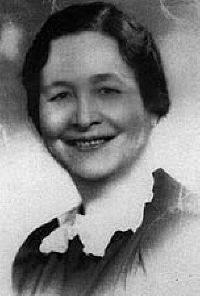
Ella Cara Deloria, also called Aŋpétu Wašté Wiŋ, was a Yankton Dakota (Sioux) educator, anthropologist, ethnographer, linguist, and novelist. She recorded Native American oral history and contributed to the study of Native American languages. According to Cotera (2008), Deloria was "a pre-eminent expert on Dakota/Lakota/Nakota cultural religious, and linguistic practices." In the 1940s, Deloria wrote a novel titled Waterlily, which was published in 1988, and republished in 2009.
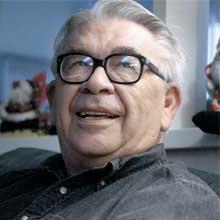
Vine Victor Deloria Jr. was an author, theologian, historian, and activist for Native American rights. He was widely known for his book Custer Died for Your Sins: An Indian Manifesto (1969), which helped attract national attention to Native American issues in the same year as the Alcatraz-Red Power Movement. From 1964 to 1967, he served as executive director of the National Congress of American Indians, increasing its membership of tribes from 19 to 156. Beginning in 1977, he was a board member of the National Museum of the American Indian, which now has buildings in both New York City and in Washington, DC, on the Mall.
Elizabeth Cook-Lynn was a Native American editor, essayist, poet, and novelist. She was considered to be outspoken in her views about Native American politics, particularly in regards to tribal sovereignty.
Indigenous decolonization describes ongoing theoretical and political processes whose goal is to contest and reframe narratives about indigenous community histories and the effects of colonial expansion, cultural assimilation, exploitative Western research, and often though not inherent, genocide. Indigenous people engaged in decolonization work adopt a critical stance towards western-centric research practices and discourse and seek to reposition knowledge within Indigenous cultural practices.
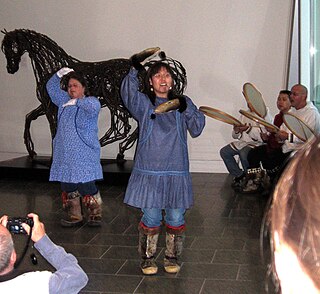
Native American identity in the United States is a community identity, determined by the tribal nation the individual or group belongs to. While it is common for non-Natives to consider it a racial or ethnic identity, for Native Americans in the United States it is considered to be a political identity, based on citizenship and immediate family relationships. As culture can vary widely between the 574 extant federally recognized tribes in the United States, the idea of a single unified "Native American" racial identity is a European construct that does not have an equivalent in tribal thought.
Salvage anthropology, related to salvage ethnography, is a term referring to the practice of collecting and documenting in the face of presumed cultural decline. In the late nineteenth and early twentieth century, salvage anthropology influenced collectors of all kinds, including those interested in music, material culture, and osteology. Ideas connected to salvage anthropology influenced how cultures were written about and documented through a wide range of publications and popular exhibitions.

Indigenous archaeology is a sub-discipline of Western archaeological theory that seeks to engage and empower indigenous people in the preservation of their heritage and to correct perceived inequalities in modern archaeology. It also attempts to incorporate non-material elements of cultures, like oral traditions, into the wider historical narrative. This methodology came out of the global anti-colonial movements of the 1970s and 1980s led by aboriginal and indigenous people in settler-colonial nations, like the United States, Canada, and Australia. Major issues the sub-discipline attempts to address include the repatriation of indigenous remains to their respective peoples, the perceived biases that western archaeology's imperialistic roots have imparted into its modern practices, and the stewardship and preservation of indigenous people's cultures and heritage sites. This has encouraged the development of more collaborative relationships between archaeologists and indigenous people and has increased the involvement of indigenous people in archaeology and its related policies.
The Native Writers' Circle of the Americas (NWCA) is an organization of writers who identify as being Native American, First Nations, or of Native American ancestry.
Beatrice Medicine was a scholar, anthropologist, and educator known for her work in the fields of Indigenous languages, cultures, and history. Medicine spent much of her life researching, teaching, and serving Native communities, primarily in the fields of bilingual education, addiction and recovery, mental health, tribal identity, and women's, children's, and LGBT community issues.

Linda Tuhiwai Te Rina Smith, previously a professor of indigenous education at the University of Waikato in Hamilton, New Zealand, is now Distinguished Professor at Te Whare Wānanga o Awanuiārangi. Smith's academic contribution is about decolonising knowledge and systems. The Royal Society Te Apārangi describes Smith’s influence on education as creating "intellectual spaces for students and researchers to embrace their identities and transcend dominant narratives".
Sherrill Elizabeth Tekatsitsiakawa “Katsi”Cook is a Mohawk Native American midwife, environmentalist, Native American rights activist, and women's health advocate. She is best known for her environmental justice and reproductive health research in her home community, the Mohawk Nation at Akwesasne in upstate New York.
The Indian princess is usually a stereotypical and inaccurate representation of a Native American or other Indigenous woman of the Americas. The term "princess" was often mistakenly applied to the daughters of tribal chiefs or other community leaders by early American colonists who mistakenly believed that Indigenous people shared the European system of royalty. This inaccurate portrayal has continued in popular animation, with characters that conform to European standards of beauty, with the most famous misrepresentation being that of Pocahontas. Frequently, the "Indian Princess" stereotype is paired with the "Pocahontas theme" in which the princess "offers herself to a captive Christian knight, a prisoner of her father, and after rescuing him, she is converted to Christianity and lives with him in his native land." - a false narrative that did not even happen quite that way to the real child who inspired the Pocahontas stories. The phrase "Indian princess", when used in this way, is often considered to be a derogatory term, a type of racial slur, and is deemed offensive by Native Americans.
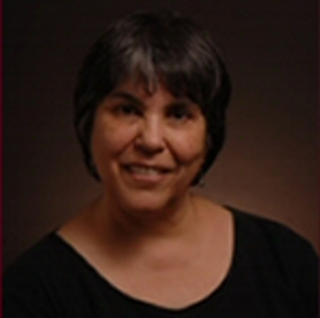
Susan A. Miller is an American Indian historian and past faculty member at Arizona State University within the American Indian Studies Program. She currently lives in Lincoln, Nebraska. She is member of the Tiger Clan and Tom Palmer Band of the Seminole Nation and attended the University of Nebraska. She has made important contributions to academia in respect to Native American history. As a historian, she has written pieces that look to educate the masses in America about the myths and lies that have been taught about Native Americans since colonization. She has helped to retell history as well as study how other academics have contributed to countering the falsities about Native American History. Some of her works are:
Indigenous Futurism is a movement in literature, visual art, comics, video games, and other media that expresses Indigenous perspectives of the future, past, and present in the context of science fiction and related sub-genres. Such perspectives may reflect Indigenous ways of knowing, oral history, historical or contemporary politics, and cultural perspectives.
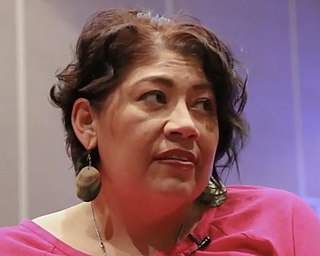
Kim TallBear is a Sisseton Wahpeton Oyate professor at the University of Alberta, specializing in racial politics in science. Holding the first ever Canada Research Chair in Indigenous Peoples, Technoscience and Environment, TallBear has published on DNA testing, race science and Indigenous identities, as well as on polyamory as a decolonization practice.
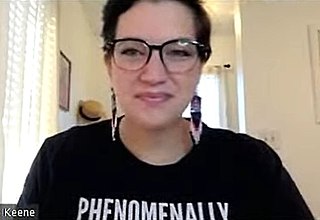
Adrienne J. Keene is a Native American academic, writer, and activist. A member of the Cherokee Nation, she is the founder of Native Appropriations, a blog on contemporary Indigenous issues analyzing the way that Indigenous peoples are represented in popular culture, covering issues of cultural appropriation in fashion and music and stereotyping in film and other media. She is also an assistant professor of American Studies and Ethnic Studies at Brown University, where her research focuses on educational outcomes for Native students.
Audra Simpson is Professor of Anthropology at Columbia University. Her work engages with Indigenous politics in the United States of America and Canada and cuts across anthropology, Indigenous studies, American and Canadian studies, gender and sexuality, and political science. She is the author of the prize-winning book Mohawk Interruptus: Political Life Across the Borders of Settler States. Simpson has won multiple teaching awards from Columbia University, and was the second anthropologist to win the Mark Van Doren Award for Teaching in the prize's history. Simpson is a citizen of the Kahnawà:ke Mohawk Nation.








